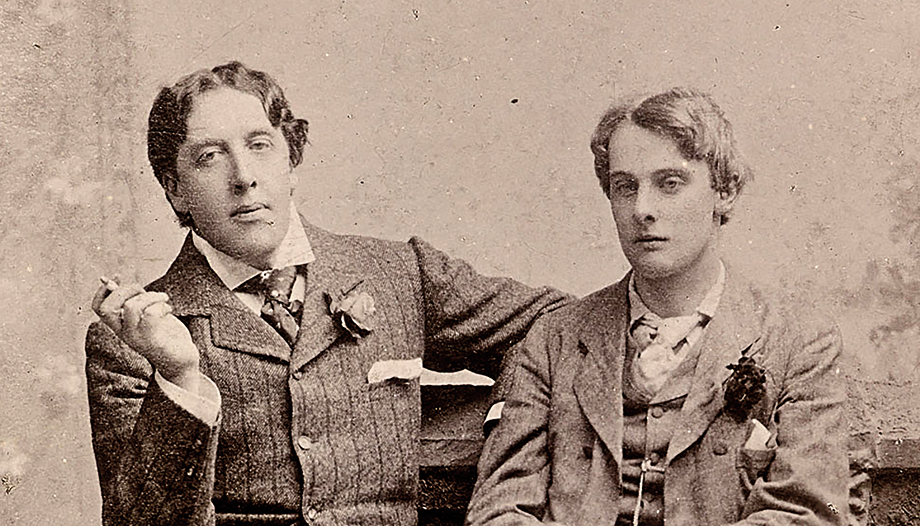Oscar Wilde was born on October 16, 1854 and dedicated his life to literature, poetry and, in particular, theater. His works -The importance of being named Ernesto, Lady Windermere's Fan, The Portrait of Dorian Gray and so many others - were a huge success in the English society of their time and are still being read or performed today.
However, it is much less known the long letter addressed to Lord Alfred Douglas, nicknamed "Bosie", the young man with whom he had a destructive love affair and for which he would be accused of sodomy and sentenced to two years in prison (1895-1897). Wilde's feelings were reflected in this letter dated in Reading prison in January-March 1897. The title De Profundis is due to his friend Robert Ross who published it in part in 1905.
After his release from prison, Wilde moved to the continent and died of meningitis in Paris on November 30, 1900, at the age of 46, after being baptized. sub conditione in the Catholic Church by the Passionist Cuthbert Dunne, also from Dublin like Wilde.
The value of pain
I am copying what a young graduate girl, impacted by Wilde's text, writes: "There is no life that can be alien to pain. However, a life guided by a gaze toward the supernatural is capable of turning that pain into a valuable object. In other words, when pain is able to transform itself into love, suffering is seen in a new and better light. This love has the ability to color everything - without hiding its reality - and forces us to focus on the beauty, sometimes hidden, that the world gives us. Like the light that can be seen under a closed door, it acts as a triumphal bell announcing the arrival of better times.
When I first read this text, I expected to find an attitude of complaint and lamentation in the face of the injustices committed against him. However, I was very surprised to discover that what came out of Wilde's pen was hope and a desire to keep the good. Today, the idea of someone being sentenced to imprisonment because of their sexual inclination is alarming; however, this was not the case in the past. I have been struck by the fact that, even in the midst of pain, Wilde was able to see and continue to see with a loving gaze those who had hurt him so much."
Absence of rancor
"Regarding his relationship with Bosie, -continues- Wilde acknowledges that it was very damaging for both of them. As is often the case in what we call 'toxic' relationships today, people experience a feeling of being out of control because of the relationship that leads to mutual destruction. Despite having been badly hurt by Bosie, Wilde does not hesitate to lay the blame on his own shoulders: 'Neither you nor your father multiplied a thousand times could ruin a man like me; that I ruined myself and that no one great or small can be ruined but by his own hand.
I am absolutely willing to say it. I am trying to say it, even if you don't believe me at the moment. If I hurl this relentless accusation against you, think what a merciless accusation I hurl against myself. Terrible as it was what you did to me, it was far more terrible what I did to myself' (p. 105).
I find this passage particularly illuminating because it illustrates Wilde's complete absence of rancor. A cursory reading of the work might place it under the category of literature of heartbreak or spite. However, the pain that is indeed evident in Wilde's beautifully written words is not equivalent to hatred. He was hurt by what happened because it was not until he arrived in prison that he realized his sad reality. He realized the pain he was causing his family and how he had been carried away by vanities and momentary pleasures.
That is the pain that is felt word for word. But it should not be confused with the pain of a man wounded by betrayal and bitterly awaiting the moment to return the damage. Amidst the regrets for his wrongdoings, Wilde's desire to be a better man, to love his wife, and to make up for lost time in caring for his two young children is also evident."
Wilde's Christological reflection
"In his letter Wilde also claims to have been comforted by the figure of Christ. In his Christological reflection he argues that the Son of God understands pain and sin as a path to human perfection. For this reason Christ never despises sinners, for he sees beyond the sins that defile their souls and focuses with a loving and compassionate gaze on the improvement they can experience because of that sin (pp. 125-148).
Pain throughout life is an inevitable and transforming experience. If it is lived in the key of hope, it can become a point of encounter with the most sacred of which we can be participants: love.".
Here is what Maris Stella Fernandez writes to me, which shows that it is well worth reading De Profundis 125 years after Wilde wrote that letter, it invites us to think about pain and love. "Era" -quoting Pearce (p. 379) - "the message of his soul to the souls of men"..








